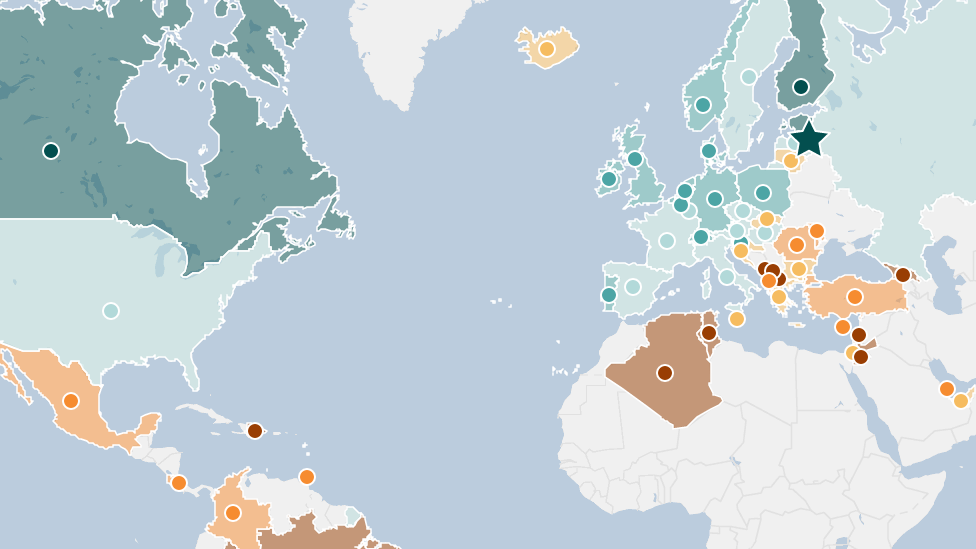OECD report backs radical reform of Welsh curriculum
- Published
We can use our size as an advantage to deliver reform, Kirsty Williams says
The organisation behind the PISA international school rankings has said Wales should continue its radical reform of the curriculum.
The Organisation for Economic Co-operation and Development (OECD) was asked by Education Secretary Kirsty Williams to report on changes.
It published its findings on the biggest overhaul since 1988 on Tuesday.
Literacy, numeracy and digital competency form the core of the new curriculum, set to be in place by 2021.
In December, the OECD published the PISA results, with Wales coming bottom of the four home nations and below countries including Singapore, Vietnam and Slovenia.
A new central curriculum has now been outlined, that gives schools the freedom to teach around it with areas such as the humanities, language, health and wellbeing.
The current four key stages of education will be replaced with "progression steps" at the ages of five, eight, 11, 14 and 16.
More than 150 pioneer schools are beginning to pilot the new way of learning.
The OECD said the changes should be underpinned by sustained investments.
'National mission'
But it warned the Welsh Government against trying to implement additional education policies, noting there is a risk of the reform journey becoming piecemeal and not reaching its objectives
Ms Williams said: "We are already taking action on many of their recommendations, from creating a new national academy for leadership, transforming initial teacher education, launching new professional standards, and introducing a national approach to professional learning.
"Our job is to continue our national mission of education reform focused on driving up standards and helping every learner in Wales, whatever their background, fulfil their potential."
The 61-page report, published on Tuesday morning to a conference of head teachers in Cardiff, notes there are still concerns about the quality of teaching.

But the OECD said it hopes the new curriculum under development will "significantly raise the bar" in terms of what Wales expects of its teachers.
It said: "In the future Wales will need a different type of teaching professional; one who has significantly more responsibility and one who understands the 'why' and the 'how' of teaching as well as the 'what'.
"These aspirations have major implications for both initial teacher training and for continuous professional learning."
The OECD also called on the Welsh Government to speed up development of leadership standards with the success of the new curriculum dependent on having "sufficient numbers" in schools.
National Union of Teachers Cymru's general secretary David Evans said in many cases the report outlines "age old arguments that everyone is very aware of" and committed to improving.
He added: "In part we can reflect on this as a consistent narrative that supports the direction unions have been setting and, at least in recent years, the Welsh Government have been more aligned with.
"At the same time it is somewhat depressing that once again these recommendations are problems that are outstanding."
Mr Evans also said there needed to be some "deep and honest thinking" from the Welsh Government about why "some of the same issues are being highlighted again.

Analysis by BBC Wales education correspondent Colette Hume
The OECD's finding will not come as a surprise to the Education Secretary Kirsty Williams, after all she commissioned their report and her response is what is to be expected. Indeed many of the areas it highlights are already being tackled.
What is interesting is the stern warning from the OECD not to add yet more policies to the raft of measures which have been put in place since 2014.
How difficult is it for politicians simply to sit and wait to see if their policies come to fruition - especially if they face a clamour for change from parents and opposing political parties.
With just four years before a new and radical curriculum is due to be taught in the nation's schools, the clocking is ticking. The OECD says the Welsh Government's efforts to recruit highly qualified individuals must be matched with high quality initial teacher training.
It says progress has been slow, but transforming the profession to meet the demands of the new curriculum "also requires those who are already teaching to adapt to constantly changing demands and continuously develop their skills".
Leadership is another clearly an area of concern for the OECD. It recommends that the Welsh Government and local authorities should promote the use of business managers for schools or groups of schools to reduce the administrative burden on school leaders.
It found that school leaders especially at primary level are "often burdened by administrative tasks" which distracts them from improving the quality of teaching and learning. School leaders I speak to talk of the sometimes daily deluge of directives they face from local and national levels.

- Published6 December 2016

- Published6 December 2016

- Published6 December 2016

- Published6 December 2016

- Published6 December 2016
